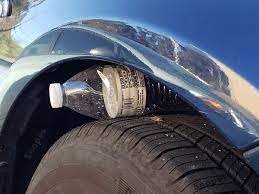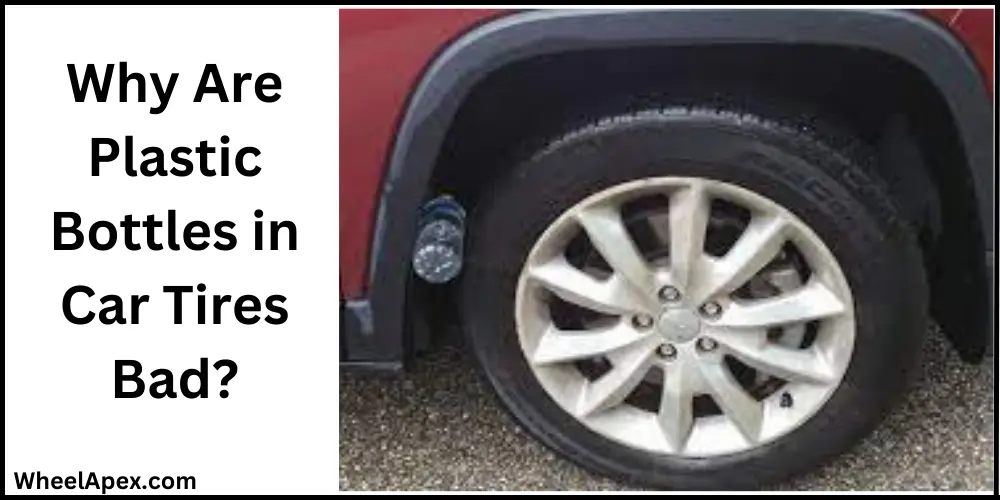In this day and age, ecological cognizance has turned into a main thrust behind numerous businesses, including the car area. As the adverse consequences of plastic waste on the climate have become visible, the journey for feasible options has picked up speed. One such development that has collected consideration is the idea of involving plastic jugs in vehicle tires.
Why Are Plastic Bottles in Car Tires Bad? Advocates contend that this could decrease plastic contamination and upgrade tire execution. Nonetheless, while the thought might appear to be engaging right away, it isn’t without its downsides and expected gambles.
This article digs into the justifications for why consolidating plastic jugs in vehicle tire size may not be the supportable arrangement we look for and investigates the ecological ramifications and security worries that emerge from this training.
Why Are Plastic Bottles In Car Tires Bad?
The utilization of plastic containers in vehicle tires has acquired fame in specific districts because of the misguided judgment that it can further develop tire execution and lessen natural effects. This training, known as “green tires” or “eco-tires,” includes stuffing disposed plastic containers into the space of a tire before fixing it. While reusing plastic containers to lessen waste might appear to be excellent, actually involving plastic jugs in vehicle tires is certainly not a suitable arrangement.
Plastic bottles in car tires are bad because they compromise safety and durability, increasing the risk of blowouts and contributing to environmental pollution. Opting for sustainable tire materials ensures safer roads and a cleaner planet.
It can prompt various unfriendly impacts, both on the security of the vehicle and the climate. My point is to reveal insight into the motivations behind why plastic containers in vehicle tires are an ill-conceived notion.
Compromised Tire Wellbeing
 One of the essential worries with involving plastic containers in vehicle tires is the split difference in tire security. Tires are designed to endure explicit tensions and give ideal hold and deal with them. At the point when plastic jugs are utilized as a trade for legitimate tire materials, it modifies the tire’s primary uprightness, possibly prompting different security issues. The plastic jugs might not have the essential sturdiness and solidarity to get through the tensions and temperature varieties that tires are exposed to during driving and tires may be under warranty. Accordingly, the tires become more vulnerable to penetrates, victories, and decreased slowing down execution, jeopardizing the driver and travelers.
One of the essential worries with involving plastic containers in vehicle tires is the split difference in tire security. Tires are designed to endure explicit tensions and give ideal hold and deal with them. At the point when plastic jugs are utilized as a trade for legitimate tire materials, it modifies the tire’s primary uprightness, possibly prompting different security issues. The plastic jugs might not have the essential sturdiness and solidarity to get through the tensions and temperature varieties that tires are exposed to during driving and tires may be under warranty. Accordingly, the tires become more vulnerable to penetrates, victories, and decreased slowing down execution, jeopardizing the driver and travelers.
Capricious Dealing with and Execution
Plastic jugs miss the mark on unambiguous material properties expected for effective tire execution. Dissimilar to the uniquely figured-out elastic mixtures utilized in customary tires, plastic containers don’t offer a similar degree of footing, strength, and street grasp. Thus, vehicles furnished with tires containing plastic jugs might encounter compromised taking care of and diminished generally speaking execution. This split the difference in execution can prompt decreased eco-friendliness, longer slowing down distances, and expanded hazard of mishaps on wet or elusive streets.
Ecological Effect
While the aim behind involving plastic jugs in vehicle tires might be to decrease plastic waste, this training can have accidentally unfortunate results for the climate. Plastic jugs are not intended for use in tires, and they are probably going to separate over the long haul because of the consistent pressure and intensity created during driving. As the plastic containers deteriorate, they discharge microplastics into the climate, adding to plastic contamination. Moreover, when these tires arrive at the finish of their life expectancy, they can’t be reused like customary tires, as they contain a blend of materials that are trying to separate, prompting extra waste.
Lawful and Administrative Issues
Involving plastic jugs in vehicle tires could likewise prompt legitimate and administrative issues in certain wards. Numerous nations have severe well-being principles and guidelines concerning auto parts, including tires. The utilization of unapproved materials in tires can prompt resistance to these guidelines, bringing about fines or punishments for both the vehicle proprietors and producers.
FAQs
What Are The Plastic Things on Car Wheels?
The plastic things on vehicle wheels are frequently alluded to as “hubcaps” or “wheel covers.” These embellishments fill both useful and stylish needs. Practically, they safeguard the wheel’s center point and fasteners from soil and trash. Tastefully, they upgrade the vehicle’s appearance by hiding the steel or compound wheel under, giving a clean and complete look.
Is It Bad to Leave Plastic Bottles in a Car?
Leaving plastic jugs in a vehicle is for the most part protected, yet it’s ideal to keep away from outrageous intensity, as it can make synthetics filter from the plastic into the water. While not promptly hurtful, delayed openness might influence taste and raise worries about potential long-haul wellbeing impacts. Putting away them in a cooler environment is ideal.
What is The Plastic Piece in Front of The Tire?
The plastic piece before the tire is known as a “sprinkle gatekeeper” or “mud fold.” It effectively safeguards the vehicle’s body from garbage, water, and mud that can be kicked up by the pivoting tire. This keeps up with the vehicle’s tidiness and forestalls expected harm to its outside.
Is There Plastic in Tires?
There is plastic in the tires. Tires are regularly made out of different materials, including normal and engineered elastic, carbon dark, and steel, yet they additionally contain plasticizers, which are added substances that assist with working on their adaptability and execution. These plasticizers are a sort of plastic utilized in tire production.
Conclusion:
While the possibility of reusing plastic containers to make eco-accommodating tires could sound engaging, actually involving plastic jugs in vehicle tires is a poorly conceived notion. It compromises the security of the vehicle and its tenants, reduces tire execution, and adds to ecological contamination. Rather than depending on shoddy arrangements that might present dangers, it is fundamental to help manageable practices, like reusing plastic containers into fitting items or advancing the utilization of eco-accommodating tires produced using reused materials. Along these lines, we can pursue diminishing plastic waste while guaranteeing security on the streets and safeguarding the climate for people in the future.
Sources:
- By Mike Colucci Why would somebody leave a plastic bottle on the tire of their car? Posted 1 Year Ago.

